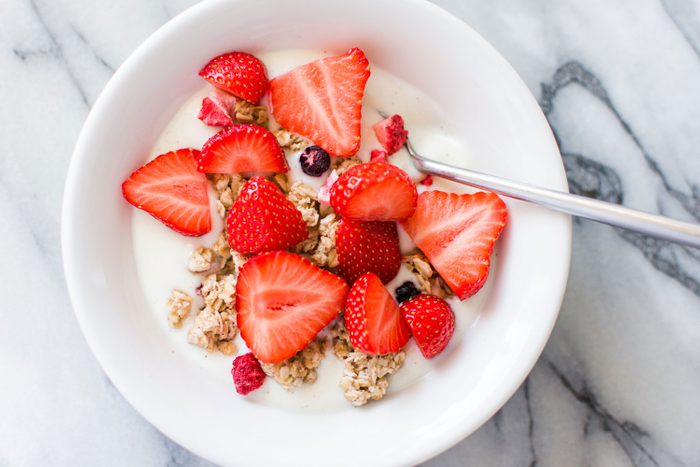New Study: Skipping Breakfast Could Lead to Higher Rates of This Disorder
Updated: Jan. 19, 2024

Plus, the breakfast foods you should reach for to reduce inflammation and give your mental wellness a boost.
Breakfast has often been called the most important meal of the day. In recent years, however, intermittent fasting and time-restricted eating waves have changed our perspective; nowadays, it wouldn’t be completely outlandish if someone ate breakfast at an unconventional time, or skipped it altogether. So, is breakfast still important?
Several studies still show that it can be important for physical and health—and what you eat for your morning meal matters more than you might suspect. Starting your day with foods that can cause inflammation, for example, might be doing more harm than good.
A new study, to be published in the March 2024 issue of the Journal of Affective Disorders, aims to evaluate the effects of skipping breakfast and the effects of eating an inflammatory diet for breakfast on rates of depression. They note that while breakfast and its relation to depression and inflammatory foods and their effect on depression have been studied, fewer studies have analyzed the relationship between the two.
The study gathered data from over 20,000 adults in the U.S., 20 years and older (with an average age of 47), from the National Health and Nutrition Examination Survey (NHANES). Researchers looked at self-reported breakfast consumption and the types of foods that the participants chose overall. The foods were compared to the Dietary Inflammatory Index (DII), an evolving database of foods that have been analyzed for their macronutrients, flavonoids, and chemical makeup for how inflammatory they tend to be in the body.
The study found that skipping breakfast was a predictor of depression, but an inflammatory diet also increased risk. “DII mediated the positive association between eating breakfast and depression,” noted the authors. Eating breakfast might reduce inflammation and reduce depression, but prioritizing foods at breakfast that are anti-inflammatory would be an even bigger boost to well-being. “Besides the frequency of eating breakfast, what you eat for breakfast was associated with chronic inflammation,” said the authors.
Along with the tendency to skip breakfast and eat an inflammatory diet, the participants with depressive symptoms were also more likely to be female, less active, smokers, and have diabetes or cardiovascular disease. So, other healthy lifestyle choices certainly played their part in mental health beyond food choices. “We recommend that adults should develop the habit of eating breakfast regularly, correct poor lifestyles, and then reduce the risk of depression,” said the authors.
14 High-Protein Breakfast Ideas That Will Help You Lose Weight
What to eat for breakfast to reduce inflammation
Foods that lower inflammation in the body can easily be part of a healthy, well-rounded breakfast, including whole grains—like oatmeal—low-fat yogurt without added sugars, fresh fruits and vegetables, eggs, and low-fat sources of protein.
Inflammatory foods you should avoid starting your day with include pastries and donuts, processed meats, and those high in saturated fat such as bacon and sausage, white bread (sorry, everything bagels), and sugary cereal. Unfortunately, your heavily sweetened coffee drink also qualifies.
In terms of meal timing, you can still follow intermittent fasting schedules and include breakfast in your diet. A recent study suggested that a fasting protocol that included breakfast was more beneficial for overall health and weight loss than one that skipped it.
- A Hollywood Nutrition Expert Just Revealed Her A-List Clients’ “One Common Challenge”
- New Study: Eating More of This Fruit Could Lower High Blood Pressure Risk by Nearly 40%
- I Ate an Old-School Low-Fat Diet for a Week—Here’s What Happened
- This “Good” Health Metric Was Just Linked with Elevated Alzheimer’s Risk, Research Finds




















